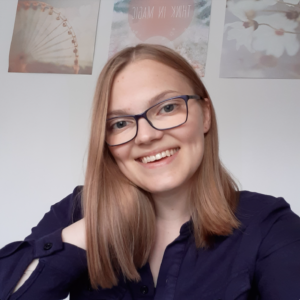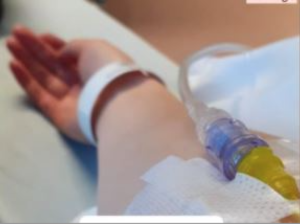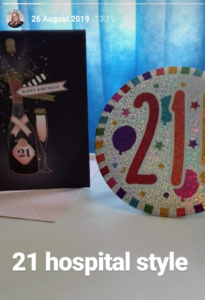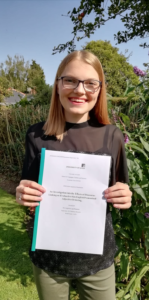The power of the blog is strong, especially when it can be part of your own self-discovery and bringing community to others. That’s someone our latest Spotlight Story Program feature writer has learned through her writing and chronic illness journey, and we’re excited to share the story of Megan Elizabeth. This British young adult dealt with a chronic illness journey many can relate to: the evolving diagnosis list. As she got older, Megan was diagnosed first with NF1, then hydrocephalus, and a couple years ago with ileocaecal Crohn’s Disease, and during that time, Megan learned not only how to adapt and find her passions, but how to build the person she would become with the constant support of her family. Megan knows the chronic illness journey isn’t always easy, but it has allowed her to learn about her resilience, strength, compassion and fun in her life, all traits that she’s adamant to advocate every young person with chronic illness discovers in themselves. With her five comforting mental reminders, Megan will give you the boost you need to recharge your life.
Hi InvisiYouth family! I’m Megan, a 23 year old digital communications officer and founder of the Hearth by Megan blog from Leicestershire, England. In my spare time, I love going on local travels with my family in our motorcaravan. I will also admit to getting emotionally invested in TV shows. Any Great British Bake Off fans out there? And like you, my life has been affected by chronic illness.
 When I was 6-ish years old (it was a long time ago), I received a clinical diagnosis of Neurofibromatosis Type 1 (NF1) – a genetic condition, although my case is spontaneous as no one else in my family has it. I have freckling and café au lait marks on my body and I also have lisch nodules on the back of my eyes. I have partial NF1, meaning only half of my cells are affected and so far, I am one of the milder cases of NF. This meant I led a pretty normal childhood, albeit an annual genetics check-up.
When I was 6-ish years old (it was a long time ago), I received a clinical diagnosis of Neurofibromatosis Type 1 (NF1) – a genetic condition, although my case is spontaneous as no one else in my family has it. I have freckling and café au lait marks on my body and I also have lisch nodules on the back of my eyes. I have partial NF1, meaning only half of my cells are affected and so far, I am one of the milder cases of NF. This meant I led a pretty normal childhood, albeit an annual genetics check-up.
A larger health shock happened when I was 13. I had an MRI scan after experiencing some neck pain, just to make sure that I didn’t have any internal fibromas, another symptom of NF.
There wasn’t much concern at the time, the scan was just going to be a baseline to go in my records. A few days later, we had a call saying the scan showed fluid on my brain and in a whirlwind week I was diagnosed with hydrocephalus and went within 24 hours of having brain surgery. I’m not too sure of the correct medical explanation, but my understanding is that I have a piece of skin blocking a channel in my brain which has resulted in enlarged ventricles. Despite two diagnoses, I was still well and discharged without surgery on the understanding that we would monitor things and have annual neurology reviews.
Since then, I struggled more with my mental health in my teens, particularly with health anxiety surrounding my conditions. With support, I got myself back on track and again was able to continue life pretty normally, bar the annual neurology and genetics appointments. I completed my GCSEs and A Levels at school and went off to study Linguistics at the University of Leeds.
 Then another diagnosis came. One which really changed my life and introduced me to the world of chronic illness. In March 2019, I developed abdominal pain and vomiting which led to a hospital admission and concerns of appendicitis. Within about 48 hours of me being admitted to hospital, I needed a scan to show what was going on. After an emergency CT scan, it turned out my appendix was fine, but part of my bowel was inflamed. A colonoscopy and biopsies later confirmed I had ileocaecal Crohn’s Disease. Since then, I have been adjusting to chronic illness life with Crohn’s, which has been a rollercoaster of flare-ups and remission, immunosuppressant medication, and hospital trips and tests along the way.
Then another diagnosis came. One which really changed my life and introduced me to the world of chronic illness. In March 2019, I developed abdominal pain and vomiting which led to a hospital admission and concerns of appendicitis. Within about 48 hours of me being admitted to hospital, I needed a scan to show what was going on. After an emergency CT scan, it turned out my appendix was fine, but part of my bowel was inflamed. A colonoscopy and biopsies later confirmed I had ileocaecal Crohn’s Disease. Since then, I have been adjusting to chronic illness life with Crohn’s, which has been a rollercoaster of flare-ups and remission, immunosuppressant medication, and hospital trips and tests along the way.
I’ve had my own blog for many years, and this really helped after my diagnosis. I discovered an incredible group of people with chronic illnesses wanting to support one another and raise awareness. Social media can be a tricky thing to navigate when you are ill and seeing other people out and about enjoying life, but the chronic illness community truly lift each other up. Whether you are in hospital, struggling with something or celebrating someone’s successes, we are all here for each other through the highs and lows.
 Since talking more about my experience, I’ve had messages from people saying that how much it has helped them. If it helps even just one other person, then it is worth doing.
Since talking more about my experience, I’ve had messages from people saying that how much it has helped them. If it helps even just one other person, then it is worth doing.
I am grateful to have the most supportive family. I can talk to them about anything, and they would never treat me differently for having a chronic illness.
Sometimes though, you don’t want to have to go through the process of explaining why you feel a certain way. Talking to others with chronic illnesses, even if different from your own, can be one of the most comforting things. To know that we are in this together and there are people out there who simply ‘get it’.
We need to talk more. There is still a great deal that needs to be done to ensure equality, understanding and respect for people with disabilities and chronic illness, to ensure access to the right care, treatment, and diagnosis, to educate non-disabled people and so much more. The more awareness made; the more action taken.
Although living with Crohn’s Disease is immensely difficult, there is so much I’ve learnt along the way. In a weird way, I think I prefer who I am as a person now (minus my gut getting attacked by my own body).
 I’m no medical expert, counsellor, or anything like that, but here are some things which help me get through the tough times and maybe something that could take comfort from too:
I’m no medical expert, counsellor, or anything like that, but here are some things which help me get through the tough times and maybe something that could take comfort from too:
- The incredible chronic illness community is ready to welcome you with open arms.
- Going through traumatic experiences helps to put things into perspective. I’ve learnt to appreciate all the good moments, no matter how small. I never really knew what people meant before when they talked about ‘creating joy’. I now see this as actively choosing to do something that makes me feel good and having a range of options for higher and lower energy days. I’ll sometimes just put an episode of Friends on for 20 minutes, purely because I know it will make me smile and bring some light to darker days.
- I used to be a major planner. I had my life mapped out and used to set lots of goals. Living with Crohn’s has taught me to live in the moment more. Learning to be present has been a positive lifestyle change. It’s important to focus on the certainty of this moment, rather than the uncertainty of tomorrow.
- I have more empathy with others and want to help people. I am more understanding and determined to make the most of life. I want to raise awareness for all of us going through the hardships that come with chronic illness. To give everyone a voice and to create a better society where people feel safe, respected, and able to talk openly about health.
- Stand your ground and be honest – Don’t be afraid to advocate for yourself if you feel like someone is not listening to you properly or respecting your concerns, even if it is a medical professional. Trust your instincts if something doesn’t feel right.
 It takes someone truly brave and strong to live with chronic illness. Remember how resilient, wonderfully unique, and beautiful you are both inside and out. We’ve got this!
It takes someone truly brave and strong to live with chronic illness. Remember how resilient, wonderfully unique, and beautiful you are both inside and out. We’ve got this!
